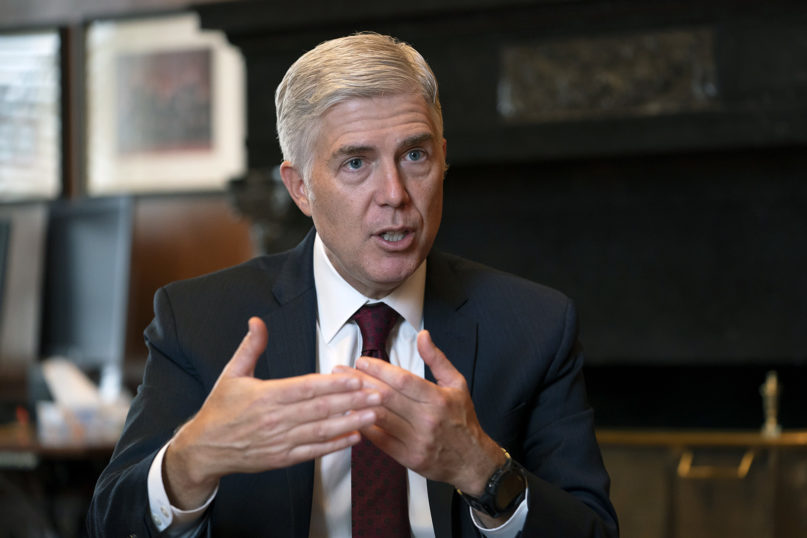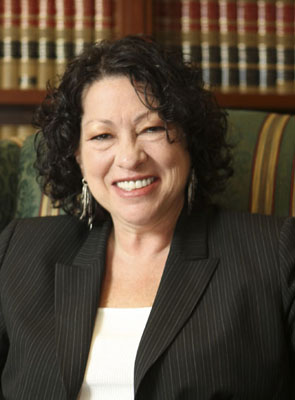(RNS) — The most consequential religion case of this year’s Supreme Court term wasn’t actually a religion decision. 303 Creative v. Elenis featured a conservative Christian website designer who, having decided to begin designing websites for weddings, claimed that her free speech rights would be violated if Colorado’s anti-discrimination law forced her to design a wedding website for a same-sex couple.
Yes, they would, said the court’s six-member conservative supermajority, with its three liberals dissenting.
Why the court chose to take up this feared possibility, in apparent violation of the Constitution’s requirement that the judiciary confine itself to actual cases and controversies, may perhaps be explained by what happened after its Masterpiece Cakeshop case four years ago. In that actual controversy, involving a Christian baker who refused to bake a wedding cake for a same-sex couple who asked him to, the court found that the Colorado Civil Rights Division had acted prejudicially in ordering the baker to bake the cake, and the case was sent back for a rehearing.
But rather than rehear the case, the Civil Rights Division decided to let the baker have his way — very likely figuring that with the famously LGBTQ-supportive Justice Anthony Kennedy now retired and replaced by Brett Kavanaugh, a second ruling against the baker would be overturned on the merits. Deprived of that opportunity, the court granted certiorari to a hypothetical.
Did I mention that Masterpiece Cakeshop was also a free speech case? One reason is that, under current First Amendment law, religious free exercise cases cannot be brought in federal court against state laws that are “neutral” and “generally applicable.” Colorado’s anti-discrimination law is both.
Still, just as the freedom of speech clause is adjacent to the free exercise clause in the First Amendment, so has free speech long been free exercise-adjacent in jurisprudence — going back to West Virginia State Board of Education v. Barnette (1943), in which the court ruled that children of Jehovah’s Witnesses could not be compelled to say the Pledge of Allegiance in school.
Indeed, Justice Neil Gorsuch, writing for the 303 Creative majority, cites Barnette repeatedly and quotes from that most famous of sentences in Justice Robert Jackson’s majority opinion: “If there is any fixed star in our constitutional constellation, it is that no official, high or petty, can prescribe what shall be orthodox in politics, nationalism, religion, or other matters of opinion or force citizens to confess by word or act their faith therein.”
Doth Gorsuch protest too much? Allowing a child to opt out of a patriotic exercise is a far cry from enabling a small business owner to discriminate against a protected class of people. Still, it’s easy enough to come up with hypothetical examples of small business owners who should be permitted to turn down clients who ask them to engage in expressive conduct (speech) they find unconscionable.
A Jewish baker, say, asked by local white supremacists to decorate a cake with swastikas. Or a Muslim glassmaker asked to design a window depicting Moses, Jesus and Muhammad. Or a Hindu flag maker asked by the Freedom from Religion Foundation to create a banner that reads, “Celebrating a Century of Godlessness.”
So why not Lorie Smith, the Christian website designer? In her case, according to Justice Sonia Sotomayor’s dissenting opinion, the court’s decision committed the “grave error” of “conflat[ing] denial of service and protected expression.”
Specifically, wrote Sotomayor, Smith conceded that “if a same-sex couple came across an opposite-sex wedding website created by the company and requested an identical website, with only the names and date of the wedding changed, petitioners would refuse. That is status-based discrimination, plain and simple.”
In the Masterpiece Cakeshop case, baker Jack Phillips said he’d have no problem with a same-sex couple coming into his store and buying a cake off the shelf for their wedding. He just didn’t want to have to create it to order for them.
Smith, while insisting that she’d design a website for a business owned by a same-sex couple, made it clear that she doesn’t want her work in any way associated with same-sex weddings. To consider that to be “compelled speech,” a la Gorsuch, is a step beyond what Phillips claimed.
The question is how many steps further this court will go.
In the Hobby Lobby case decided a decade ago, the court for the first time permitted a for-profit corporation a religious free exercise right, in that case to refuse to comply with the Affordable Care Act’s requirement that female employees receive contraception coverage as part of their health plan — provided the for-profit company was “closely held” and its religious belief “sincere.”
Will the current court extend a right to refuse wedding services to same-sex couples to family-owned companies like Hobby Lobby that have hundreds of stores and thousands of employees? What about publicly traded companies? At this point it’s impossible to say where it will draw the line.
This week, the Minnesota state Court of Appeals, deferring to an order from Gorsuch, decided that an Amish community doesn’t have to obey state health regulations and install a septic system to treat water used for dishwashing, laundry and bathing (“gray water”) — because the government failed to demonstrate a compelling interest in its doing so in violation of religious scruples.
When the free exercise of religion trumps gray water treatment, can toilet waste be far behind?







